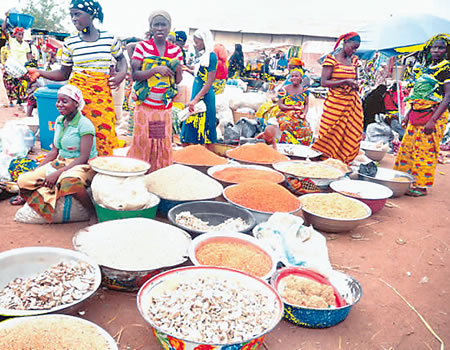FOLLOWING the report of the National Bureau of Statistics (NBS) that Nigeria has exited its worst economic recession, prices of basic food items in major markets across the country remain as diverse as its socio-cultural components.
Many people spoken to by our correspondents say the prices still remain high and that they are in fact not sure that the country has exited recession. Yet in some parts of the country, respondents report changes in prices of foodstuffs by as much as 30 to 30 per cent. However, most Nigerians would love to see prices of food stuffs go much lower that they are presently due partly to the fact that money is not flowing as it should.
A visit to Ogba Market, a foodstuffs market within the Benin metropolis, by Sunday Tribune showed that there is a considerable drop in the general prices of foodstuffs. The drop is most observable when prices of commodities two or three months ago are put side by side with the current prices.
For instance, a bag of gari that was hitherto sold for N13,000 some three months ago is now sold for N7,500. In turn, the price of a ‘rubber’ (measurement) of gari has dropped from N1,000 to N600. As for beans, a rubber is now being sold for N1,000 as against N1,100 or N1,200 it was sold for about two months ago.
Rice has also recorded appreciable drop with a bag now being sold for N18,000 down from N23,000 which was the cost some months back. As for a rubber of rice that was sold for N1,300, it is now sold for N1,100.
The price of yam, however, appears not to have experienced any significant drop. A medium-sized yam is still sold for about N700. Those who cannot afford the dry yam have however settled for the new yam with its prices ranging between N300 and N600 depending on the size.
At the Oba Market located at the King’s Square, prices of the above listed food items were similar to each other with the Ogba market recording cheaper prices.

A rice seller in the market, Mrs Ruth Egbagbe, said she did not know what was responsible for the drop in the prices of rice, but as a seller, she can only add her little profit to the supplied prices to make some profits.
Same here
The story is the same in Ondo State where respondents told Sunday Tribune said prices have crashed but only a little, compared to what it used to be many months back. A major survey conducted by our correspondent at some markets in the state capital indicated a reduction in the prices food stuffs and essentials such as rice, beans, gaari, Palmoil, groundnut oil and other consumables.
At the neighborhood market in Akure, one of the traders who spoke with our reporter, Mrs Bummi Agunbiade, said a bag of rice now sells for N14,800 as against previous price of N17,500 and above. According to her, a bag of beans that used to sell for N28,000 now sells forN22,500.
She explained that a kongo (measurement) of rice sells for N520 from N800 while that of beans now sell between N680 and N700 from N850. She however lamented that the two food items are still scarce in the market.
Another trader, Mrs Adebisi Babalola, who sells palm oil and groundnut oil at Isinkan market, also said that there is a noticeable reduction in the prices of both commodities. She said palm oil sells for N11,600 per gallon and groundnut oil sells for N12,500, as against previous prices of N17,000 and N18,000 respectively.
For gari and yam the news is cheery. Prices have crashed considerably such that consumers a re asking for more. A gari seller, Madam Aruwajoye said the commodity now sells for N180 per measurement as against N450.
“We have recorded great sales after the drop in the price of gari. We have not been able to meet the demand of the consumers in recent times and the reduction in the price is responsible for this. We will be glad if there is a great reduction again so that the lives of our people will be better,” she said.
Coincidentally it is the season of yam, so the prices are affordable. Madam Salamotu Lawal, a yam seller told Sunday Tribune that the season has aided the downward trend in the price of yam. According to her, five tuber of yam is solid at the market for between N1200 and N1500. She added that the only problem being faced by traders is that of getting the product into the market.
Just like Delta too
In Delta state, prices of foodstuffs have also nosedived. A market survey carried out by Sunday Tribune at Igbudu Market, Warri, in Warri South Local Government Area of Delta State, revealed that prices of food items such as yam, rice, beans and corn have reduced drastically.

Alhaji Ibrahim Dogo, a yam dealer from the north said while the recession was biting hard, 100 big tubers of yam went for N100,000, but now, after the recession, 100 tubers of yam go for N70,000 now retailed at N700 per tuber as against N1,000 previously. Invariably, the price decrease could be put at 30 per cent after the recession.
Dogo said there were no challenges in getting supplies, as “we go to the north to buy and bring them here to sell without problems.”
Another food stuffs seller who simply identified himself as Mr John, corroborated Dogo’s view. According to him, during the recession, a bag of rice sold for N22, 000 as against N17,400 it is now being sold. The reduction percentage leverages at 20.9 per cent though this is not the case across board.
For example, a bag of beans (white) was initially sold for N28,000 but it is now N27,000 which is only a 3.57 per cent reduction. Similarly, a big bag of corn sold for N18,000 during the recession now goes for N13,000 at a reduced 27.77 per cent.
Speaking on challenges faced in the trade, John said “there are really no challenges, except for rice.” He however alleged that it seems that the Customs was bent on stopping imported rice from coming to the South, but allows it to go to the north.
No difference here
At Ogbete main market in Enugu, the Enugu State capital, Madam Grace Ugwoke, a rice seller told Sunday Tribune that a 50kg bag of imported rice is N21,000 just like it was during recession. Likewise, the price of 50kg bag of local rice ranges between N18,000 and N17,000 just like before the announcement of the country’s exit from recession.
Price of beans has reduced drastically from N8,000 per bushel to N1,400 a drop of more than sixty per cent.
At Kenyatta market in the city, there are no changes in the prices of staple commodities such as rice, beans and yam, though prices of tubers of yam vary depending on their sizes, ranging from N300 to N400 and N700.
Underscoring the no change in prices situation, a food stuffs seller, Mr. Eze Okoroafor told Sunday Tribune that an imported 50kg bag of rice which used to be N20,000 still retains the old price.
“I know (the price of) yam will fall soon. Harvest season is here and when we go to the North, we will buy them cheap,» Okoroafor stressed.
Some of the food stuffs sellers spoken to by Sunday Tribune however lamented that one major challenge facing traders is the hike in transport fares since the roads are bad which invariably leads to high price of commodities which buyers often complain about.
“Prices of foodstuffs are still unstable”
Alhaji S.A Jimoh, president, rice sellers association and market leader
Some days ago, the price of rice has been increasing gradually due to scarcity, Only those that have it in their shops are the ones selling at this time. The price depends on several factors. That will determine what to sell. If sellers bought rice at a reduced price, it will be sold at less price and vice versa. Before the scarcity of rice last week, they had been selling a bag of rice at between N12,800 and N13,500. But presently, it costs N15,000-N15,500. The most significant reason for
Mr Olanrewaju Ayandeji
We are still in recession until proven otherwise. The prices of foodstuffs, which many cannot do without, are so high. If recession was the reason that foodstuff prices rose so much then, and they want us to believe we are out of it, then things should return to where they were. But a bag of rice is still high at the rate of 15000, while beans sells for N22, 000(oloyin),N21,500(drum),N19,000(white beans), respectively, and a bag of wheat at N18000 is also high.
Mrs Lukemon Fatimo
Alhaja Koleosho
Nigeria Customs Service is the reason the prices of goods are expensive due to the huge amount of money that they usually demand from rice importers from Cotonou. We go outside to buy rice because of the refusal of our people to patronise the local product, especially ofada and other local rice species.
Mr Bolaji Adetola
Prices are fluctuating; it has never been stable. We cannot be too sure that the prices at which we buy food stuffs today is what it will be tomorrow. Some months ago, we bought big and small bags of rice for N13,500 and N13,000 respectively, but presently, the prices have risen. A bag of rice is now N16,000, while small bag is N14,000. Prices of beans vary, depending on where you get it from. This is very bad. Prices of goods should not be this high if the economy is that good.
Mrs Jelilat Olabisi
We are not out of recession at all. Many still can’t afford to eat three square meals because the prices of foodstuffs are increasing every day. Today, it is a different case entirely for tubers of yam are sold at the rate of N1,200 each. Whether we are in recession or out of it, we can’t really spot the difference now because thing are not going well with the masses in our country. We urge the government to do something quickly to allay people’s fear.
—Additional report by Temidayo Akolwawole, Grace Bulus and Blessing Abiodun







